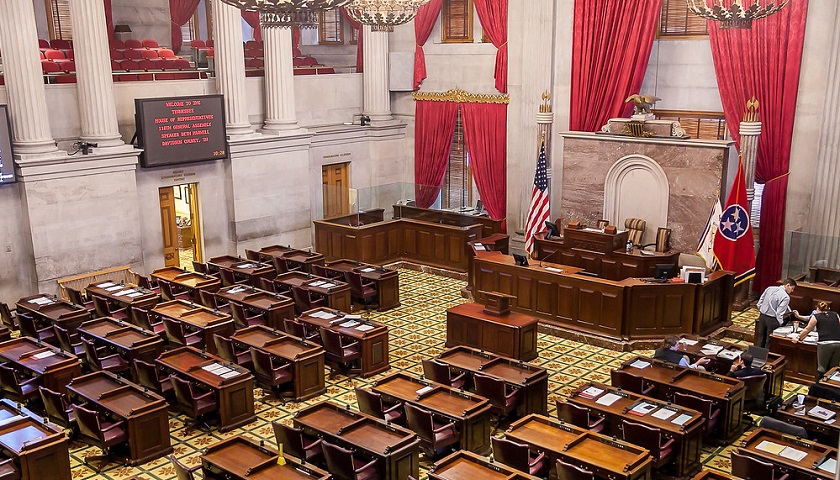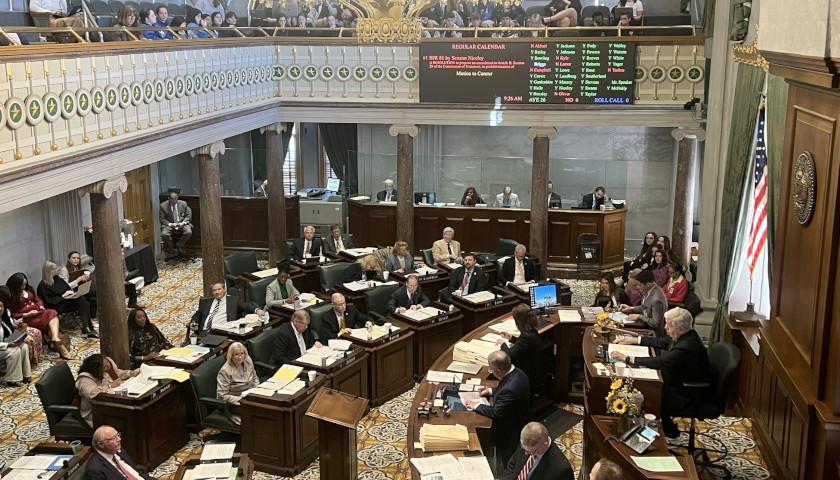by John Harris
In the movie Shooter, Mark Wahlberg, who is playing a retired sniper, refers to Tennessee as the “patron state of shootin’ stuff.” Some Tennesseans smiled and said, “Yep”! Our volunteer spirit, patriotism, sacrifices in war, and culture of owning and enjoying firearms is a generational right – particularly when it involves constitutionally protected rights.
Apparently, many in our Legislature and our Governor have a differing view.
The Republican-controlled supermajority, especially Leadership, and a Republican Governor refuse to act like constitutionally principled leaders on 2nd Amendment issues. Their procedural dirty tricks and shenanigans do not just pertain to firearms issues. Consider the stunts being used to pass a massive gas tax increase, their successful effort to take away our right to vote for judges, increasing the state’s budget by approximately $7 billion in just a few years while claiming that they “reduced taxes”, their support of Common Core, Medicaid expansion, and the creation of ObamaCare exchanges.
How has this happened?
From its procedural toolbox, Legislative leadership has allowed “ghost voting” and secret “pre-meetings” and abused the committee system with pre-ordained members and choreographed committee productions.
But perhaps their most effective tool is their use of the Fiscal Review Committee and their “Fake Fiscal Notes”. These “fiscal” determinations are used to sidetrack policies by claiming they are just too expensive for the state to include in the budget even if the budget impact is a reduction in taxes or fees on the citizens.
So what is a fiscal note?
Simply, it should be a fair and balanced estimate of the budget impact of a particular piece of legislation. It should calculate, based on reasonable, fact-based assumptions, any changes in revenue and/or expenses produced by such legislation.
That is what it should be.
For example, the Haslam gas tax increase is projected to raise taxes on fuel by as much as $500 million a year with combined state and local increases. That is a “positive” fiscal note because it increases the state’s revenue. “Negative” fiscal notes decrease state revenue.
So what is a “Fake Fiscal Note”? Well, it is one that has unreasonable or even false data or which is based on unreasonable assumptions. It can be used to sidetrack or demolish certain legislation, particularly if its demise is predetermined by Leadership or desired by the administration.
So how has this dirty trick been used against 2nd Amendment legislation? Consider the bills that have been offered the last 4 years on either Permit-less Open Carry or full Constitutional Carry.
One of the main falsehoods directed against these policies has been a recurring “estimate” of enormous, unacceptable budget impacts on the entire state if these bills became law. They assert that tens of thousands of people would no longer apply for or renew handgun carry permits.
What were the “facts” that led the Fiscal Review Committee to issue “Fake Fiscal Notes” against such policies? Follow this thread of legislation and the bipolar responses to the Fiscal Note determinations year to year and it will become clear.
In 2014, Rep. Micah Van Huss filed HB2409, allowing individuals who could lawfully possess a handgun to carry it openly without paying the state a fee, taking a training class or undergoing more background checks. The 2014 fiscal review process included a statement by the Tennessee Department of Safety in an email from Lisa Knight to her supervisors that the Department had “no reliable way to determine the true Fiscal Impact of this proposed legislation so we will have to say that the Department does not anticipate a significant negative impact.” However, the Fiscal Review Committee staff estimated a 20% reduction in the number of permits. The bill was voted down in the House Finance Committee.
Department of Safety = no significant negative impact.
Fiscal Review Committee = 20% reduction.
In 2015, Rep. Micah Van Huss and Sen. Mae Beavers filed essentially the same legislation again, HB0684 and SB0784. The Committee concluded that there was no basis to project any fiscal impact, but, it stated, that for each 1% reduction in permits that “might” occur there would be an impact on revenue. The important thing is that in 2015 neither the Legislature’s Fiscal Review staff nor the Tennessee Department of Safety could substantiate any basis for any probable reduction in permits or revenue if that bill passed.
“Allowing persons to openly carry (non-concealed) a firearm without a permit will, however, provide some cost savings for a very small cohort of firearm owners. Due to the retained value in holding a handgun carry permit, any reductions in handgun carry permit applications and renewals as a result of this proposed change is considered small, but not zero.” (The 2015 Fiscal Note, Page 2.)
Again:
“The department could see a revenue loss, but its impossible for us to determine an actual impact as we have no way of knowing how many current permit holders would want to continue to renew their permit if they could legally carry open without a permit. We have no way of knowing in the future how many new applicants this would or would not apply for a permit, since they could legally carry open if this bill is passed without a permit.” (The 2015 Fiscal Staff report, Page Three
Despite having no basis to project a reduction in state fees, the “Fake Fiscal Note” estimated the loss based on a 20% reduction in applicants for handgun permits. But the 2015 fiscal note, if read carefully, did not assert that a reduction was likely or probable. Instead, it said “if” a reduction occurred then the impact for each 1% of change would be as stated in the note.
That “conditional” reading of the fiscal note was confirmed in an email dated March 22, 2014, from Jeff Spaulding, who was the Fiscal Review director at the time.
Fiscal Review Committee = no reduction likely or probable.
(Bi-polar) Fiscal Review Committee = 20% revenue reduction
In 2016, the Open Carry bills were filed as HB1748 and SB1483. Open Records Requests were submitted to obtain the details in what, at first review, appeared to be yet another “Fake Fiscal Note”. The February 25, 2016, fiscal note states:
“Based on information provided by DOS, a minimum of 20 percent of current and future handgun permit holders will choose not to purchase initial or renew existing handgun carry permits due to the provisions of the bill.”
However, a review of the information from the Tennessee Department of Safety failed to provide any reasonable basis for the Fiscal Review Committee staff’s estimated 20% reduction in the number of permits or renewals. The documents obtained from the Tennessee Department of Safety stated that there was no way to estimate that there would be any reduction in the number of permit applications.
However, that “if” statement was quickly buried as the Department of Safety went on its task of projecting revenue losses if there were hypothetical reductions at random intervals of 5%, 10% and 20% in the number of permits. Why not estimate 100%?!
The issue is not a simple math calculation of what is the revenue on each 1% of applicants. The issue is whether there was a reasonable basis to estimate that passing a “Permit-less” Open Carry law would foreseeably result in an actual reduction in the number of permit applications and, if so, at what rate? Clearly, a few would be immaterial. But it was equally probable that the number of applications might rise if people started carrying and then realized that by getting a permit they could carry in about 35 other states and not just Tennessee.
Department of Safety = No way to estimate any reductions
Fiscal Review Committee = 20% reduction in permits
As expected, the “Permit-less” Open Carry legislation was filed again in 2017. Again, Rep. Micah VanHuss and Sen. Mae Beavers brought forward HB0040 and SB0131. This time, the Fiscal Review staff could not state that there was any basis upon which to estimate that there would be any reduction in the number of permits if Open Carry were to be enacted. Despite that, this time the staff concluded that there would be a “one percent minimum reduction” which contrasts drastically with the 20% estimated reduction that the staff used in 2016. Even at a one percent reduction, the staff estimated that allowing citizens to openly carry firearms without a permit would cost the state approximately $178,000 per year in fees that it otherwise would have certainly received. (Keep in mind that there was little mention made of any potential reductions to staff as a result of permit application reductions.)
What is more amazing, however, is the fiscal note on the 2017 Constitutional Carry legislation that was carried ultimately by Rep. Andy Holt and Sen. Kerry Roberts. HB0493 and SB0131. On this bill, the Department of Safety said once again that “… we have no way of knowing how many people will decide not to apply or renew.” Although there was “no way of knowing” what percentage decrease there would be if Constitutional Carry were enacted, the Department of Safety just assumed that it might be a 10% reduction. It then provided revenue loss estimates if the loss were 5%, 10% or 25%.
So, what did the Fiscal Review staff, now under the leadership of Krista Lee since 2016, do with the fact that the Department of Safety said it had no way of estimating how many Tennesseans might not get permits if Constitutional Carry was enacted? Ms. Lee signed a report to the Legislature in which she stated that “if this proposed legislation is enacted, 60 percent of new applicants each year will decide not to obtain a handgun carry permit …” and she also “assumed that 40 percent of existing permit holders up for renewal each year will not renew.” Based on these assumptions, she projected the fiscal impact of Constitutional Carry to be approximately $8.55 million per year through lost application fees.
Department of Safety = “no way of knowing percent of reductions”
Fiscal Review Committee = 60% will not renew
Conclusion? The fiscal projections on several 2nd Amendment bills over the last four years provide specific evidence that the Legislature’s Fiscal Review staff is not generating reasonable, fact-based projections founded upon reasonable assumptions as evidenced here by repeated statements by the Department of Safety.
Since “Fake Fiscal Notes” are so prevalent on 2nd Amendment legislation, there’s little doubt that such shenanigans are similarly at work on other legislative initiatives opposed by the Governor and the Legislative Leadership.
One might conclude that having the Legislative leadership in a position of control over the Fiscal Review Committee “might” have some impact on who serves in that administrative function and perhaps even what might be expected in terms of weaponized use of fiscal notes. For the welfare of the citizens, the question may be whether the fiscal review process must be taken away from the Leadership in the Legislature and moved to a state agency that is specifically charged with fiduciary duty to generate fair, unbiased, non-manipulated, non-partisan fiscal projections.
That is, is it necessary to remove the potential from the Legislative leadership that the fiscal review process has been or can be weaponized politically to pass or support legislation inappropriately? Only if you want legitimate law-making where all the citizens of the state have the right to have bills considered on the floor on reasonably established facts since, after all, Tennessee is not yet “Wonderland” – or at least we should hope it is not.
# # #
John Harris is the executive director of the Tennessee Firearms Association.









[…] John Harris, writing in The Tennessee Star, was dead on in his description of “Fake Fiscal Notes.” Harris suggested studying “Fiscal Note determinations year to year” which makes it easy […]
Something that would be a game-changer would be the ability to file charges of perjury against any Legislator, aide, lobbyist, staffer, etc. who makes false testimony in a Committee hearing.
Of course they would have to be “sworn in” and I understand the need for that. Come to think of it; the need to be “sworn in” might make them think twice about making or promoting a fabrication.
Since when does “Budget Considerations” become a factor in deciding if Constitutional Rights can be exercised?????
That “Swamp” in Nashville needs to be drained along with the one in DC.
Since the RINOs became a supermajority in Nashville.
And for the Fiscal Review Committee, in the future there will be a 100 percent reduction in HCL renewals at my house. I’ve bought my last permission slip.
The “House” needs to be cleaned & representatives that actually represent the people, rather than their own agenda, be VOTED in (not hand picked or appointed) by the majority. This…toying, with our Constitutional Rights has gone on way too long & is based entirely on money matters, which, have nothing to do with the Constitution or the Bill of Rights.
Cut congress’ pay…that would be a tremendous boone to the fiscal help the state MAY stand to lose for the ramsom of a right! Mr. BILL “Pilot Corporation” Haslam, stands to gain tremendously from the proposed gas tax as well. Put the skids on that & watch him jump around like a grasshopper on a hot skillet!